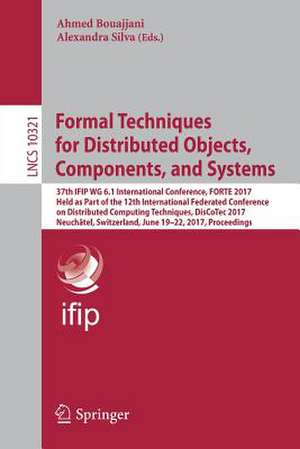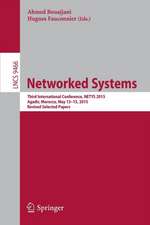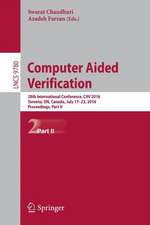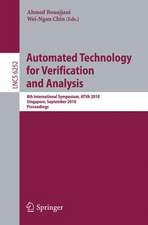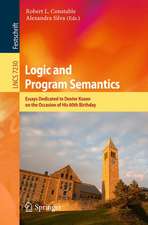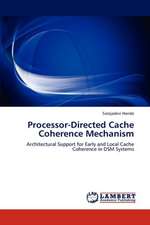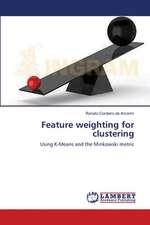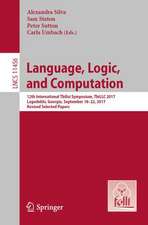Formal Techniques for Distributed Objects, Components, and Systems: 37th IFIP WG 6.1 International Conference, FORTE 2017, Held as Part of the 12th International Federated Conference on Distributed Computing Techniques, DisCoTec 2017, Neuchâtel, Switzerland, June 19-22, 2017, Proceedings: Lecture Notes in Computer Science, cartea 10321
Editat de Ahmed Bouajjani, Alexandra Silvaen Limba Engleză Paperback – 28 mai 2017
Din seria Lecture Notes in Computer Science
- 20%
 Preț: 1061.55 lei
Preț: 1061.55 lei - 20%
 Preț: 307.71 lei
Preț: 307.71 lei - 20%
 Preț: 438.69 lei
Preț: 438.69 lei - 20%
 Preț: 579.30 lei
Preț: 579.30 lei -
 Preț: 410.88 lei
Preț: 410.88 lei - 17%
 Preț: 427.22 lei
Preț: 427.22 lei - 20%
 Preț: 596.46 lei
Preț: 596.46 lei - 15%
 Preț: 448.04 lei
Preț: 448.04 lei - 20%
 Preț: 353.50 lei
Preț: 353.50 lei -
 Preț: 389.49 lei
Preț: 389.49 lei - 20%
 Preț: 309.90 lei
Preț: 309.90 lei - 20%
 Preț: 645.28 lei
Preț: 645.28 lei - 20%
 Preț: 763.23 lei
Preț: 763.23 lei - 15%
 Preț: 580.46 lei
Preț: 580.46 lei - 20%
 Preț: 310.28 lei
Preț: 310.28 lei - 20%
 Preț: 655.02 lei
Preț: 655.02 lei - 20%
 Preț: 1183.14 lei
Preț: 1183.14 lei - 20%
 Preț: 340.32 lei
Preț: 340.32 lei -
 Preț: 449.57 lei
Preț: 449.57 lei - 20%
 Preț: 591.51 lei
Preț: 591.51 lei - 18%
 Preț: 938.83 lei
Preț: 938.83 lei - 20%
 Preț: 337.00 lei
Preț: 337.00 lei - 20%
 Preț: 649.50 lei
Preț: 649.50 lei - 20%
 Preț: 607.40 lei
Preț: 607.40 lei - 20%
 Preț: 1414.79 lei
Preț: 1414.79 lei - 20%
 Preț: 1024.44 lei
Preț: 1024.44 lei - 20%
 Preț: 583.40 lei
Preț: 583.40 lei - 20%
 Preț: 453.32 lei
Preț: 453.32 lei - 20%
 Preț: 575.49 lei
Preț: 575.49 lei - 20%
 Preț: 1075.26 lei
Preț: 1075.26 lei - 20%
 Preț: 585.88 lei
Preț: 585.88 lei - 20%
 Preț: 825.93 lei
Preț: 825.93 lei - 17%
 Preț: 360.20 lei
Preț: 360.20 lei - 20%
 Preț: 763.23 lei
Preț: 763.23 lei - 20%
 Preț: 340.32 lei
Preț: 340.32 lei - 20%
 Preț: 504.58 lei
Preț: 504.58 lei - 20%
 Preț: 369.13 lei
Preț: 369.13 lei - 20%
 Preț: 580.93 lei
Preț: 580.93 lei - 20%
 Preț: 343.62 lei
Preț: 343.62 lei - 20%
 Preț: 350.21 lei
Preț: 350.21 lei - 20%
 Preț: 583.40 lei
Preț: 583.40 lei - 20%
 Preț: 583.40 lei
Preț: 583.40 lei - 15%
 Preț: 438.59 lei
Preț: 438.59 lei - 20%
 Preț: 341.95 lei
Preț: 341.95 lei - 20%
 Preț: 238.01 lei
Preț: 238.01 lei - 20%
 Preț: 538.30 lei
Preț: 538.30 lei
Preț: 330.56 lei
Preț vechi: 413.21 lei
-20% Nou
Puncte Express: 496
Preț estimativ în valută:
63.27€ • 68.75$ • 53.18£
63.27€ • 68.75$ • 53.18£
Carte tipărită la comandă
Livrare economică 21 aprilie-05 mai
Preluare comenzi: 021 569.72.76
Specificații
ISBN-13: 9783319602240
ISBN-10: 3319602241
Pagini: 243
Ilustrații: XIV, 243 p. 50 illus.
Dimensiuni: 155 x 235 mm
Greutate: 0.37 kg
Ediția:1st ed. 2017
Editura: Springer International Publishing
Colecția Springer
Seriile Lecture Notes in Computer Science, Programming and Software Engineering
Locul publicării:Cham, Switzerland
ISBN-10: 3319602241
Pagini: 243
Ilustrații: XIV, 243 p. 50 illus.
Dimensiuni: 155 x 235 mm
Greutate: 0.37 kg
Ediția:1st ed. 2017
Editura: Springer International Publishing
Colecția Springer
Seriile Lecture Notes in Computer Science, Programming and Software Engineering
Locul publicării:Cham, Switzerland
Cuprins
Session types for Link failures.- Learning-based compositional parameter synthesis for event-recording automata.- Modularising opacity verification for Hybrid Transactional Memory.- Proving opacity via linearizability: a sound and complete method.- On futures for streaming data in ABS.- Session-based concurrency, reactively.- Procedural choreographic programming.- An observational approach to defining linearizability on weak memory models.- Applying a dependency mechanism in the formal development of voting protocol models using event-B.- Weak simulation quasimetric in a gossip scenario.- Reasoning about distributed secrets.- Classical higher-order processes.- Weak nominal modal logic.- Type inference of simulink hierarchical block diagrams in Isabelle.- Creating Büchi automata for multi-valued model checking.- Privacy assessment using static taint analysis.- EPTL - a temporal logic for weakly consistent systems.
Caracteristici
Includes supplementary material: sn.pub/extras
